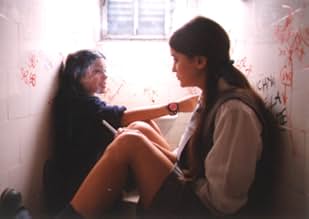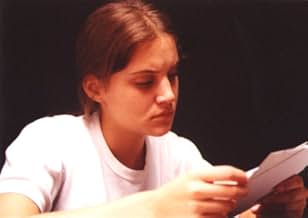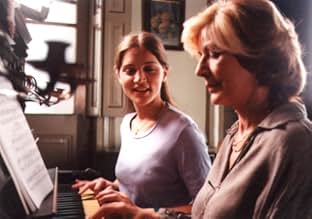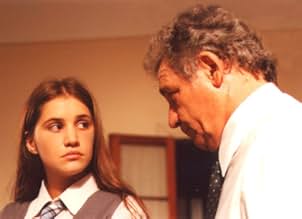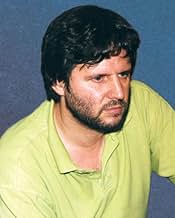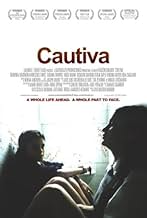Aggiungi una trama nella tua linguaCristina's life is thrown into turmoil when she is suddenly escorted from her strict Catholic school in Buenos Aires and told that she is really Sofía Lombardi, the daughter of activists who... Leggi tuttoCristina's life is thrown into turmoil when she is suddenly escorted from her strict Catholic school in Buenos Aires and told that she is really Sofía Lombardi, the daughter of activists who disappeared in the '70s. Questioning everything she once thought true, Cristina embarks o... Leggi tuttoCristina's life is thrown into turmoil when she is suddenly escorted from her strict Catholic school in Buenos Aires and told that she is really Sofía Lombardi, the daughter of activists who disappeared in the '70s. Questioning everything she once thought true, Cristina embarks on a journey to find her true identity. Meeting others like herself, the young girl soon di... Leggi tutto
- Regia
- Sceneggiatura
- Star
- Premi
- 5 vittorie e 13 candidature totali
Recensioni in evidenza
Is there any worse thing than what happens here? I can't think of more than one (murder, in all its forms). I think even rape is "less bad"! Before turning this into a "moral philosophy", let me point at the scenes I liked most: 1) When Sofía and her expressive Spanish friend have this important talk about life, surrounded by soccer. Now as before, quenching everything that matters. The "paralelism" is challenger indeed! 2) Having Ives's "The unanswered question" as a musical score when... (I can't say more!) 3) Final scene (aerial take, Handel?) 4) The shower scene, between the two now women, "naked" in more than one sense 5) The brawl between the Quadris and Sofia. An one moment, Pablo starts treating Sofia as a stranger, almost an enemy. Suddenly, her "dear daughter Cristina" is dead, even before he hits her. (maybe a bit predictable I guess) 6) (you may laugh) "The nightmare". It made me realize true horror is not what Hollywood sells us, it's opening a door into the unknown (in her grandma's or aunt's house) and finding a glimpse of a life frozen in time (her dead mother's). The film luckily avoids many pitfalls. Has only one very unbelievable moment, when a nun's teen escapes from Tribunales, from the same savvy cops who reduce the also hard boiled Pablo Quadri. Tribunales' zone is very WELL FILMED, feels absolutely real to somebody like me who's hanged around there very often. Retiro, the trains, both schools... It's a very Argentine film! By the way, found it great how she "downgraded" economically from her rather posh house in the suburbs to her grandma's "dark old house" & derelict Citroen! The contrast between the nun's school, which is not luxurious but looks like when compared to the truly depressing state school!
I was surprised about the performances! Have to say I didn't expect much from this film, for a) I don't like Argentine cinema b) the subject is normally a sign of a tsunami of clichés c) didn't have much faith in Lombardero. When I saw "Hugo Arana" I feared the worst :) I had to gulp my prejudices, they both acted surprisingly subduedly, without overemphasis. I had my "lesson", they taught it to me. I would have liked to know what was being played during the film, I loved the usage of classical music throughout the film (not in just a couple of broken scenes). My kudos to the director, of whom I knew nothing, and who (thanks IMDb!) has been a "sound editor" in mainstream American cinema! Well, I hope he continues to surprise us!
"Captive" complements the film "The Official Story" very well and emphasized the importance of historical memory, both for a country and for an individual. Cristina, like Alicia ("The Official Story"), is blissfully living in ignorance of the truth until someone else brings it to her attention. Both female characters are at first doubtful of the fact that so many people simply "disappeared". Their doubt then turns to belief and surprise that they didn't know earlier.
Cristina Quadri (the deeply impressive Bárbara Lombardo) lives with her parents in Buenos Aires, attending a Catholic girls' school, seemingly a happy young teenager. One regular day she is called to the principal's office and told she must visit a judge, a frightening concept for a young girl who is forced to go without informing her parents. The judge informs her that she is not 'Cristina Quadri' but instead 'Sofía Lombardi', the daughter of a couple who 'disappeared' in 1978 as political prisoners. A recent blood test Cristina/Sofia thought was a follow-up for a post-op check was actually a test to match her blood with that of the newly discovered true parents' family. Cristina, stunned by her lack of true identity, confronts her 'adopted parents' and struggles with the officials who insist she be returned to her blood relatives. Cristina becomes close to another 'adopted' girl and the two explore their roots, finding that they were born in prisons and then given to police officials to be placed in homes. The transition from adopted to blood family is the path the film explores: despite the comforts of present life the girls must know their origins to fully realize their identities.
The cast is uniformly strong, the concept of the film works well as Biraben snaps us back and forth between the World Cup Soccer Game in Buenos Aires in 1978 that contrasts so gravely with the concurrent underground disappearance of the intellects of the country, and the performance by Lombardo holds the credibility of the story well. There is a fine music score by José Luis Castiñeira de Dios that combines a suite for cello and piano with elements from Mozart's Requiem very effectively. This film has been awarded many prizes since its appearance in 2003: the prizes are justly deserved. Highly recommended viewing. Grady Harp
Lo sapevi?
- QuizA statement at the end of the film reads "Those responsible, except for a few cases of house arrest, are free." This changed on July 5, 2012, when the first sentences for baby theft from political prisoners during the 1976-1983 "dirty war" were handed down. The longest went to former leader Jorge Videla, who was found criminally responsible for overseeing the systematic theft of babies, and given the maximum sentence of 50 years in prison.
I più visti
Dettagli
Botteghino
- Lordo Stati Uniti e Canada
- 16.259 USD
- Fine settimana di apertura Stati Uniti e Canada
- 2220 USD
- 12 nov 2006
- Lordo in tutto il mondo
- 16.259 USD
- Tempo di esecuzione
- 1h 55min(115 min)
- Colore
- Mix di suoni


